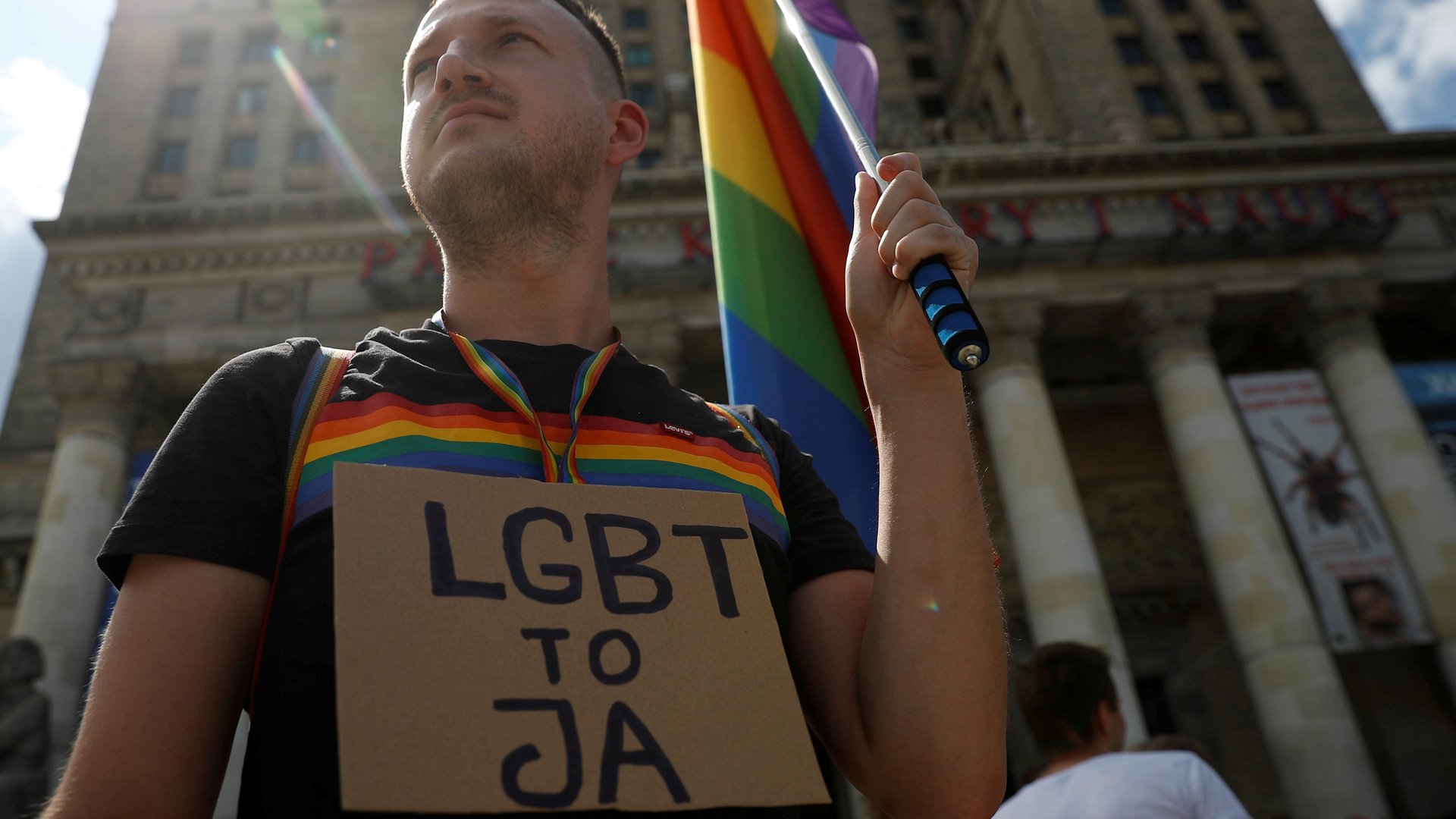Scores of Poles are revealing they are LGBT on Twitter after violent attacks on a pride parade
Scores of Poles are revealing themselves to be gay, bisexual, trans, or queer on social media, following violent attacks on a pride parade in eastern Poland last week. They talk about how they are regular people, teachers, doctors, high school students or just neighbors you might pass on the street or in the grocery store. Others are joining in as allies of the community, all under the hashtag #jestemLGBT or “#IamLGBT.” It became the top trending hashtag on Twitter in the country, with many thousands of entries.


Scores of Poles are revealing themselves to be gay, bisexual, trans, or queer on social media, following violent attacks on a pride parade in eastern Poland last week. They talk about how they are regular people, teachers, doctors, high school students or just neighbors you might pass on the street or in the grocery store. Others are joining in as allies of the community, all under the hashtag #jestemLGBT or “#IamLGBT.” It became the top trending hashtag on Twitter in the country, with many thousands of entries.
“#IamLGBT” I am a lifeguard, a government worker, a volunteer firefighter. I teach students how to save lives and ensure safety. I live and I love”
On July 20, in the city of Bialystok, a small gay pride parade was met with vitriolic response from the local community, and was attacked by soccer hooligans, resulting in dozens of injuries. The police identified more than 100 people who took part in the brawls, and the event reignited a debate over tolerance, violence, and the polarized political climate in the country.
The LGBT community has become a punching bag for the ruling conservative Law and Justice party in the run-up to the EU parliamentary elections this spring and national parliamentary elections this fall. The party has equated support for the LGBT community with “Western,” progressive values, which Law and Justice and its supporters eschew.
“We don’t have to emulate those who are in the West, we don’t have to stand under the rainbow flag, we can stand under the red-and-white one,” Jaroslaw Kaczynski, the powerful leader of Law and Justice said earlier this month (link in Polish).
After the march, Dariusz Piontkowski, the minister of education, said “these kinds of marches, initiated by circles that try to push non-standard sexual behaviors elicit enormous resistance. Thus we should think about whether these kinds of events should be organized in the future at all.” (link in Polish)
The anti-LGBT rhetoric is also drummed up by the highest representatives of the Catholic Church, which is highly powerful and influential in the country.
Later, many officials condemned the violence, but critics pointed out previous rhetoric from representatives of the ruling party, accusing them of inflaming the situation (link in Polish).
The Twitter hashtag campaign #jestemLGBT is reminiscent of the viral, global #metoo campaign, capitalizing on the power of individual stories and the social media contagion effect. It was started to “annoy” the right wing by one user in a tweet peppered with expletives, but ended up as a collection of stories and heartfelt messages.
Here are some examples of the stories shared by Polish users:
“This is a great initiative, so here’s my turn. #IamLGBT and I’m a journalist. You read my articles and you’ve probably seen my night-time broadcasts from the parliament. After 12 years together, I would like to finally become a wife.”
“#IamLGBT I am an evangelical (calvinist) pastor, and I preach that God loves everyone, I officiate LGBT weddings.”
“#IamLGBT and I’m with #LGBT. Me, a regular, plain, balding engineer at a lab, a chemist. And I feel good about it.”
Many of the tweeters are teens and young people:
“#IamLGBT and I want to be someone who helps others. I want to study criminology and be good at it. I also want to do something with music. It’s possible that you will encounter me as I hand you your coffee or cake at a coffee shop. It’s possible that one day I’ll also help your child.”
“#IamLGBT and I don’t want to take away your children. I want to graduate from film school and make movies that provide your families with entertainment on Sunday nights.”
“Hi, I’m not #IamLGBT, but my best friends are. I’ve never met better people, they are my whole world. They are people just like anyone else. I cannot fathom losing them only because someone doesn’t like who they love.”
Politicians joined in:
“#IamLGBT, I’m a lawyer, a local representative, and I’m in the Sejm [lower chamber of the Polish parliament]. The Sejm, which belongs to all of us. The Sejm, where the bill about civil unions that I proposed lingers. The Sejm, which surely will pass it into law one day, because equality and love will win with hatred and exclusion.”
Robert Biedroń is the most prominent politician who is out as gay in Poland. The former mayor of Slupsk, he started his own political movement, and is now a member of the EU parliament.
“#IamLGBT as well, and like you, I have goosebumps when I sing the [national anthem], I get emotional when I hear about the heroes of the Warsaw Uprising, joy when I see the Polish flag abroad. Because I love Poland and want to be (and one day will!) an equal citizen of my homeland.”